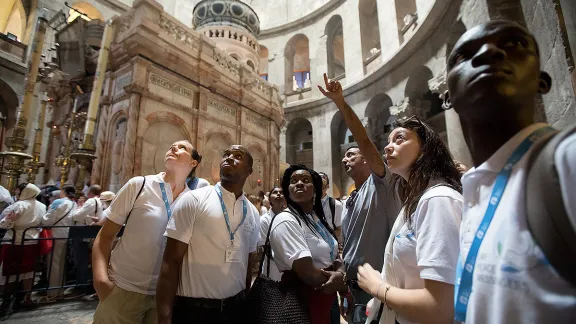
Participants in the LWF Peace Messenger Training tour the Church of the Holy Sepulchre in Jerusalem on Friday September 22, 2017 while visiting holy sites in the Old City. Photo: ELCJHL/Ben Gray
ELCJHL Bishop Azar: law excludes other religious groups
(LWI) The Lutheran World Federation (LWF) is concerned about the impact that a new law passed by the Israeli parliament will have on the human rights of minorities. The law, passed on 19 July, defines Israel as the “national home to the Jewish people” and limits the “right to exercise self-determination within the State of Israel to the Jewish people”.
In a statement, Bishop Ibrahim Azar of the Evangelical Lutheran Church in Jordan and the Holy Land (ELCJHL), an LWF member church, expressed his concern about the consequences this law would have for other religious groups in the country. He likened the law to apartheid, calling it “fundamentally divisive, racist and destructive.” The majority of the Christians in the Holy Land, as well as the 3,000 members of ELCJHL are Arab-speaking Palestinians.
“Creating a sub-class of people”
On 19 July, the Knesset (Israeli parliament) passed a law defining Israel as a Jewish state and Hebrew as its primary language. The law also encourages the development of Jewish settlements.
“Declaring that Israel is no longer ‘home’ to non-Jews, or for those citizens representing Arab culture, has officially created a sub-class of people in the nation,” Azar writes. “This law deliberately excludes the 1.5 million citizens of Israel who identify as Arab Israeli. It also ignores the presence of citizens and residents who are members of other religious groups and the significant contributions they make to Israeli society.”
“This law deliberately excludes the 1.5 million citizens of Israel who identify as Arab Israeli. It also ignores the presence of citizens and residents who are members of other religious groups and the significant contributions they make to Israeli society.”
Future of Christians in Israel?
“We stand with our member church, the Evangelical Lutheran Church in Jordan and the Holy Land, as it experiences discrimination and exclusion,” said LWF General Secretary Rev. Dr Martin Junge. “We are very concerned about the impact this law will have on the Christian churches in the Holy Land, which are already under great pressure. We are also concerned about the implications this law will have on the different religious groups in the Holy Land. Peaceful co-existence is threatened.”
Other religious leaders, among them local churches, have equally voiced their concern about the nation-state law.
At its annual meeting in June, the LWF endorsed a public statement regarding Palestine, affirming “the LWF’s support for a two-state solution to the conflict between Israel and Palestine” and the LWF perception of Jerusalem “as a capital city shared between the two peoples and three religions”, opposing “all actions which seek to change the status quo absent a final status agreement."
The Evangelical Lutheran Church in Jordan and the Holy Land serves in Israel, Jordan and the Palestinian Territories. LWF also has a development program in the Palestinian Territories, supporting young people with vocational training. The LWF Augusta Victoria Hospital in East Jerusalem provides specialized health care to Palestinians from Gaza and the West Bank.


